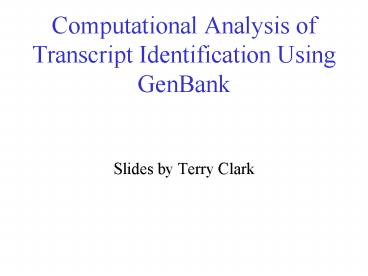Computational Analysis of Transcript Identification Using GenBank - PowerPoint PPT Presentation
Title:
Computational Analysis of Transcript Identification Using GenBank
Description:
Computational Analysis of Transcript Identification Using GenBank. Slides by Terry Clark ... D. Rowley. San Ming Wang. Terry Clark. Andrew Huntwork. Josef Jurek ... – PowerPoint PPT presentation
Number of Views:52
Avg rating:3.0/5.0
Title: Computational Analysis of Transcript Identification Using GenBank
1
Computational Analysis of Transcript
Identification Using GenBank
- Slides by Terry Clark
2
Differentiation of hematopoietic cells
3
(No Transcript)
4
Genome-wide gene expression
5
(No Transcript)
6
(No Transcript)
7
(No Transcript)
8
(No Transcript)
9
(No Transcript)
10
(No Transcript)
11
(No Transcript)
12
(No Transcript)
13
(No Transcript)
14
(No Transcript)
15
(No Transcript)
16
SAGE (Serial Analysis of Gene Expression)
17
Figure 1 Schematic illustration of the SAGE
process
Jes Stollberg et al. Genome Res. 2000 10
1241-1248
18
SAGE GLGI Overview
19
What is the chance of duplicate tags?
- We can assume we are drawing randomly from the
set of all 4-letters sequences of the given tag
length - This is the same problem as having unique
overlaps in the contig matching problem for
shotgun sequencing
20
Random Model
21
Random model does not reflect biological process
- Genes evolve by duplication as well as point
mutation - Many motifs are repeated
- Function widgets at work?
- Result is a strong bias in observed biological
sequences, not a uniform distribution as the
simple model hopes. - Here are some numbers .
22
SAGE tags match to many genes(Tags from
Hashimoto S, et al. Blood 94837, 1999)
23
Tag Frequency Groups for 10-base Tag
SetContaining 878,938 Tags for UniGene Human
24
Unique Tags among 878,938 EST Derived Tags
25
Unique Tags among 32,851 Gene Derived Tags
26
Converting tag into longer 3 sequence
27
Generation of Longer 3'cDNA for Gene
Identification (GLGI)
28
UniGene Human 3 Part Length Distribution
29
Myeloid Tag Matches with UniGene Human SAGE Tag
Reference Database
30
SAGE Tag Processing with GIST
31
k-mer tree
32
(No Transcript)
33
GIST Performance with Improved IO
34
Conspirators
Terry Clark Andrew Huntwork Josef Jurek L.
Ridgway Scott
Sanggyu Lee Janet D. Rowley San Ming Wang































